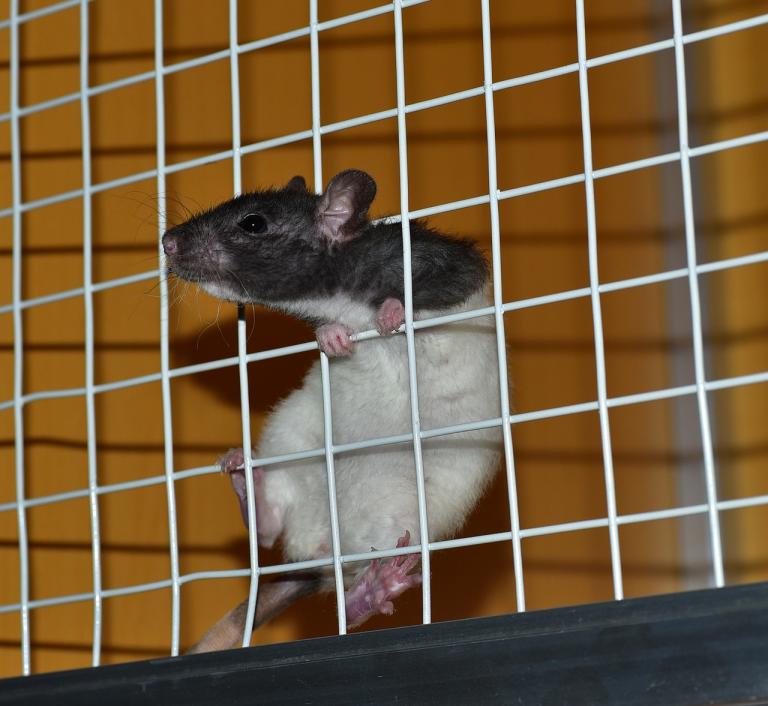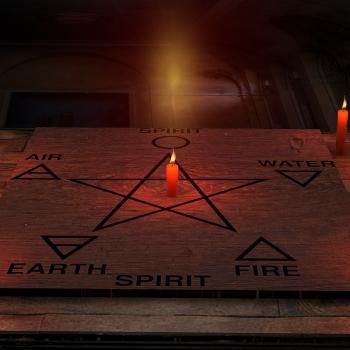I was down at the local metaphysical shop, browsing with some friends, when I ran across a deck of cards purporting to talk about “animal wisdom.” Sure, yeah, our cute (and not so cute) animal “friends” have a lot to teach us. Sadly, that isn’t a sign of their wisdom so much as a sign of our disconnection.
We can say that wolves mean loyalty, and rabbits symbolize fecundity, and so on. But setting that aside, it is better to focus on the animal that we have most to learn from: humans.

Despite All My Rage, I Am Still Just a Rat in a Cage
Animal wisdom is a strange misnomer; it is nothing of the sort. In English, when we want to talk about the knowledge that animals have, knowledge that exists in a non-verbal world beyond everyday human experience, we use the word instinct.
Our ancestors lived in the geography of nature. A storm could kill them, an unlucky hunt could injure them, and drought or cold weather could starve their whole people. They could not imagine the world we live in now, and did nothing to prepare us for it.
The everyday person in Western culture works a job in one box, lives in a different box that marks their social status, drives a third box that marks their mating status, and eats food bought in a fourth box that describes their tribal affiliation. We get most of what we know from a series of smaller boxes.
So for the everyday person, yes, animals certainly seem wise. They have not forgotten the geography of the real. And they know things that we either can’t remember or force ourselves to forget.
Eat when you’re hungry. Sleep when you’re tired. Have sex when you can. Fight when you must.
Many of us have forgotten that we, too, are animals. We have our own “animal wisdom” – our own instincts. They are powerful and meaningful. And mostly, we suppress them just to get along.
![By LisaSympson [CC BY-SA 3.0 (https://creativecommons.org/licenses/by-sa/3.0)], from Wikimedia Commons](https://upload.wikimedia.org/wikipedia/commons/0/08/Cat_Eating_Catgrass.jpg)
Living in this weird world of boxes, we have little understanding of hunger. Yes, there are people who go hungry. But for many people (especially around where I live), food has become entertainment. We don’t so much eat to live as eat to feel something.
While sometimes we don’t eat when we’re hungry, just as often we eat when we’re not. We find ourselves eating because we smell food, or see a commercial with symbolic food literally designed to set us off. But we’re hardly in touch with the instincts that drive this.
When I was in the hospital, dying by inches, I learned the flip side of this: eating is not about pleasure, it’s about life. And while it’s one thing to be able to spout this aphorism, it’s a much harder thing to actually live by it.
Our ancestors lived in a world of scarcity, and human instinct will always be to eat when there is food. Whether it’s commercials with their tantalizing images, or burger places with their fried-food smells, they’re communicating here is food and working to bypass your forebrain and lure you into feeling something that isn’t really there.
Animal instinct is to eat when there’s food. Human wisdom is to understand that other humans are baiting a trap for you. Remember to eat when you’re hungry, but only when you’re hungry.

Sleep When You Are Tired
Especially just after the beginning of Daylight Savings Time(1), it’s pretty easy to see the wisdom in listening to our instincts. When I was younger, the cycle of television used to lure me into staying up late. The 24 hour news-cycle does worse by keeping us in a constant state of near-panic.
Humans aren’t pack animals, who band together for the hunt. We aren’t herd animals, who come together for defense. We’re band(2) animals, and we work together for comfort as much as anything else. And that means always being with the group.
While our parents may have mocked us for giving in to peer pressure, that desire to be with the group is an instinct, not just some immature need. There are some people who don’t need others, but by and large people band together to live their lives. That is the way of humans.
But that doesn’t mean that we have to listen to every instinct, every time. Feeling your own needs is an instinct, too. When we’re tired, we must rest. And when others tell us that we can’t, because we might miss something, it’s time to tell them to wake us up if it’s actually important.
Have Sex When You Can
For humans, sex is complicated. It is powerful. Driven by instinct, it connects to every other part of our lives. Yes, there are people who can treat it with impunity. I’m not one of them.
I am neither for nor against the endless variety of gender and relationship configurations that humans exhibit. Not to put too fine a point on it, I mostly vacillate between not caring one whit and finding the variation intellectually interesting.
What is important, however, is self-knowledge. I am a strong believer that people should not tie themselves in knots over what they “should” do. The world is a more harmonious place if we find relationships that work for us.(3)
“Animal wisdom” shows us that, for different animals, “have sex when you can” means different things. For wolves it can mean relative monogamy, and for bonobos it means sex as a social activity. For different people it means different things, too.
We don’t have to be slaves to instinct, but we also can’t afford to be divorced from them either. Being an adult means being able to repress our instincts. But as with all forms of repression, the energy we push down slips out in other ways. It’s always better to harness who we are than try to kill it.

Fight When You Must
Living in a world of plenty, but being grade-A primates, we humans love our conflict. It isn’t always to-the-death, winner-take-all, toe-to-toe brutality. Everyday human conflict is mostly socially constrained fighting for status, rank, and power.
In other words, dominance-play is a huge part of all our relationships with other people. While society is seemingly infinitely complex, at its core it is a distribution system for resources and power. We engage in struggle to improve and protect our position in the hierarchy.
But when it comes down to instinct, it is best for us to fight only when we must. Dominance-play aside, life and death fighting is for people who don’t have any other choice. Most of the martial artists I have known understand this. They have been interested in gathering power, but have little interest in expending it willy-nilly to show off.
ProTip: It’s one thing to talk about instincts, but an entirely different one to access them. But fear not, your instincts are already shaping your life. The trick is to recognize them.
In order to understand hunger, you might consider some fasting. While we usually think of fasting as being about food, it can be used with any need.
This type of fasting isn’t about exerting control and suppressing need. It’s about feeling the effects and changes in the self while experiencing want.
You don’t even have to wait a whole day to feel the effects of a fast. You can begin, here and now, by drawing a breath and holding it. Fifteen seconds and you’re fine. Thirty and you begin to feel the buildup of carbon dioxide in the blood. Panic will start. That’s instinct, kicking in. Breathe.(4)
See, your instincts work fine. And now you’ve begun to listen to them. Well done.
Throughout the day, look to see what else happens. Maybe keep some notes in your personal journal. You’ll find that your instincts are very much alive and well, and ready to serve you as best they can.
Eat when you are hungry. Sleep when you are tired. Have sex when you can. Fight when you must. Your life will be better for understanding who you are.
—
(1) Daylight Savings Time is a thing we do in the United States where we move the clock ahead an hour in Spring so that sleeping times and clock times are more closely aligned. The transition period after the switch, each year, is a reminder that clocks are terrible monsters whom we should not let rule our lives.
(2) In sociopolitical typology, a band is a group of humans that ranges up to about a hundred and fifty people, as marked off by Dunbar’s number. Mostly, when people refer to “tribes” of hunter-gatherers they are actually referring to bands.
(3) All human societies have marriage, though the variations are nearly endless. Family is a natural human social structure, but what that means is (more or less) whatever we can manage.
It is key when talking about relationships, to distinguish between what we can imagine and what we can accomplish. When I was much younger, and mostly under the influence of the author Robert Heinlein, I thought that people should be able to manage polygamy.
What I have discovered, as an adult, is that some people are wired for it and some aren’t. I’m in the latter category and happy there. I found someone else equally interested in monogamy, and that works for us.
At the same time, I have friends who range across the spectrum of gender and a number of marriage and relationship configurations. The trick is to figure out what works for you, and do that.
(4) Don’t go around holding your breath if you have a medical condition that means it will harm you. ‘Nuff said.















